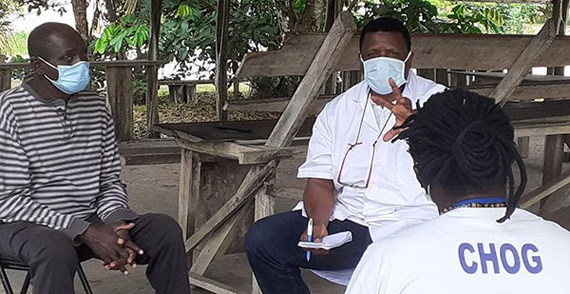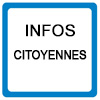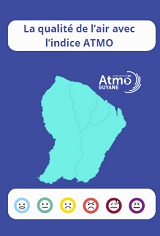Blada.com
mardi 10 février
Boîtes aux lettres
Courrier des lecteurs
Petites annonces
Emploi / Formation
Covoiturage
Infos citoyennes
Infos citoyennes
26/02/21
Vaccination : mieux comprendre et répondre aux peurs des patients
 A Saint-Laurent du Maroni, des chefs coutumiers amérindiens et bushinenge ont exprimé leur opposition ou leur réticence vis-à-vis du vaccin contre le Covid-19. Le Dr Mohamed Sakho, responsable du centre de vaccination du Chog, en a rencontré quelques-uns afin de répondre à leurs interrogations.
A Saint-Laurent du Maroni, des chefs coutumiers amérindiens et bushinenge ont exprimé leur opposition ou leur réticence vis-à-vis du vaccin contre le Covid-19. Le Dr Mohamed Sakho, responsable du centre de vaccination du Chog, en a rencontré quelques-uns afin de répondre à leurs interrogations.
« Chez nous, les Bushinenge, si je demande à quelqu’un de se faire vacciner et que cette personne décède, j’aurai un problème avec sa famille, et ma famille aussi, pour tout ma vie. Et le conflit continuera après entre nos familles. » En deux phrases, mardi, Edouard Pinas, capitaine des Djukas de Charvein, à Mana, a résumé au Dr Mohamed Sakho pourquoi il n’organisera « pas de réunion pour dire aux gens de se faire vacciner ». En outre, il est contre : « J’ai 73 ans. Je vais mourir. Je préfère que ce soit tranquillement. » Le responsable du centre de vaccination de Saint-Laurent du Maroni a régulièrement l’occasion d’échanger avec les chefs coutumiers de l’ouest guyanais. « Leurs questions m’enrichissent. Elles me permettent de comprendre et de répondre à leurs peurs. »
 Ces peurs, Edouard Pinas s’en fait le porte-parole : « On nous dit que ce sont les Blancs qui ont créé cette maladie pour tuer les vieux, parce qu’il y a trop de monde sur Terre. On se demande aussi pourquoi le vaccin n’est autorisé qu’à partir de 50 ans, si ce n’est pour tuer les vieux. A Charvein, tout le monde est pauvre. Peut-être qu’ils viennent tester le vaccin sur nous. Peut-être que le vaccin est efficace, mais peut-être aussi qu’on le prendra et qu’on en mourra. Des Français nous ont aussi dit qu’il ne fallait pas prendre le vaccin parce qu’il a été créé par des Américains. »
Ces peurs, Edouard Pinas s’en fait le porte-parole : « On nous dit que ce sont les Blancs qui ont créé cette maladie pour tuer les vieux, parce qu’il y a trop de monde sur Terre. On se demande aussi pourquoi le vaccin n’est autorisé qu’à partir de 50 ans, si ce n’est pour tuer les vieux. A Charvein, tout le monde est pauvre. Peut-être qu’ils viennent tester le vaccin sur nous. Peut-être que le vaccin est efficace, mais peut-être aussi qu’on le prendra et qu’on en mourra. Des Français nous ont aussi dit qu’il ne fallait pas prendre le vaccin parce qu’il a été créé par des Américains. »
« Les fake news s’appuient souvent sur des peurs propres à notre personne ou à notre culture, constate le Dr Sakho. Quand, comme moi, on vient d’un pays où avoir beaucoup d’enfants est signe de réussite et de force, on sera plus sensible aux rumeurs prétendant que le vaccin rend impuissant. »
Bénédicte Fjeke, cheffe coutumière du village kali’na de Terre Rouge et élue au conseil municipal de Saint-Laurent du Maroni, se souvient de la peur provoquée, en début d’épidémie, par les tests. « Un jour, j’ai réuni ma population et je lui ai dit : Voilà, il y a ce virus qui se propage. Quelqu’un qui vient de l’extérieur peut être malade, alors faites-vous tester. Deux familles ont refusé. Ce n’est pas grave, je n’oblige personne. Mais ça n’a pas manqué : elles ont fini par l’attraper et ont dû se faire tester. »
Son village a été l’un des premiers où ont été organisée des campagnes de dépistage. Sur les groupes WhatsApp des chefs coutumiers, elle a partagé ses initiatives pour organiser des cérémonies traditionnelles comme le lever de deuil, tout en respectant les gestes barrières. Elle n’a jamais hésité à envoyer les plus fragiles aux urgences en cas de symptômes ou à houspiller les plus jeunes qui sortaient puis rendaient visite aux plus âgés sans précaution. Elle ne manque aucune réunion sur le Covid-19, que ce soit avec l’antenne territoriale de l’ARS ou avec la préfecture. Mais face au vaccin, elle se montre indécise : « J’aimerais voir ce qu’il y a à l’intérieur de ce vaccin, être sûre à 100 %. »
Dans son village, elle sait qu’une personne s’est fait vacciner. Ainsi que deux collègues à elle « parce qu’elles ont la santé fragile ». Elle craint que le vaccin ne devienne quasi obligatoire en cas de création d’un passeport vaccinal. Sa collègue Claire-Suzanne Poulin, cheffe coutumière du village Espérance, a pris les devants et a rencontré le Dr Sakho, mercredi matin. « Je ne veux pas faire comme d’autres chefs et dire qu’il n’y aura pas de vaccin dans mon village. Chacun doit pouvoir décider lui-même. Il faut donc qu’il y ait de l’information. »
Dans son village, où une partie de la population conteste sa nomination comme cheffe, certains ont fait courir le bruit – par ignorance ou par inimitié – qu’à l’occasion de sa rencontre avec le Dr Sakho, le Chog allait vacciner les habitants de force. Une jeune femme, souffrant de comorbidités, profite de la rencontre pour interroger le responsable du centre de vaccination : « Elle a reçu des vidéos affirmant que le vaccin contenait une puce de 5G. » Rassurée sur ce point, elle se dit favorable à la vaccination « parce que si je tombe malade de manière grave et que le maire ou une autre personnalité est malade en même temps, ce sont eux qui auront une place à l’hôpital. Pas moi ! »
« Il y a des questions que l’on n’imagine même pas que les gens se posent, constate le Dr Sakho. C’est important de pouvoir leur répondre. » Dans leurs cabinets de Saint-Laurent et de Mana, les Dr Michelle Golzak et Catherine Truong entendent les mêmes interrogations, de la part de leurs patients, voire d’autres professionnels de santé. Quand elles évoquent le vaccin, les refus sont parfois virulents.» Mais le Dr Goldzak, présidente du Syndicat des médecins de l’ouest guyanais (Smog) est optimiste : « De plus en plus de patients souhaitent être vaccinés. »
In Saint-Laurent du Maroni, Native American and Bushinenge customary chiefs have expressed their opposition or their reluctance to the vaccine against the Covid-19. Dr Mohamed Sakho, head of the Chog vaccination center, met some of them to answer their questions.
“Back home, with the Bushinenge, if I ask someone for the vaccine and that person dies, I will have a problem with their family, and my family as well, for my whole life. And the conflict will continue afterwards between our families. " In two sentences, on Tuesday, Edouard Pinas, captain of the Djukas de Charvein, in Mana, summed up to Dr Mohamed Sakho why he will "not organize " a meeting to tell people to be vaccinated". Furthermore, he is against: “I am 73 years old. I will die. I prefer it to be peacefully. The person in charge of the Saint-Laurent du Maroni vaccination center regularly has the opportunity to interact with the traditional chiefs of western Guiana. “Their questions enrich me. They allow me to understand and respond to their fears. "
Edouard Pinas speaks these fears: "We are told that it is the Whites who created this disease to kill the old, because there are too many people on Earth. We also wonder why the vaccine is only allowed from the age of 50, if not to kill old people. In Charvein, everyone is poor. Maybe they come to test the vaccine on us. Maybe the vaccine works, but maybe we will also take it and die of it. The French also told us that we should not take the vaccine because it was created by Americans. "
“Fake news is often based on fears that are unique to us or our culture,” notes Dr. Sakho. "When, like me, you come from a country where having a lot of children is a sign of success and strength, you will be more sensitive to rumors that the vaccine makes you powerless. "
Bénédicte Fjeke, traditional head of the Kali’na village of Terre Rouge and elected to the municipal council of Saint-Laurent du Maroni, remembers the fear caused at the start of the epidemic by the tests. “One day, I gathered my people and I said to them: There is this virus spreading. Someone from the outside may be sick, so get tested. Two families refused. It’s okay, I’m not forcing anyone. But it was not lacking: they eventually caught him and had to be tested. "
His village was one of the first where screening campaigns were organized. On the WhatsApp groups of traditional chiefs, she shared her initiatives to organize traditional ceremonies such as mourning, while respecting barrier gestures. She never hesitated to send the most fragile to the emergency room in case of symptoms or to nag the youngest who went out and then visited the elderly without precaution. She never misses any meeting on Covid-19, either with the regional office of the ARS or with the prefecture. But in the face of the vaccine, she is indecisive: "I would like to see what's inside this vaccine, to be 100% sure. "
In her village, she knows that someone has been vaccinated. As well as two of her colleagues "because they are in poor health." She fears that the vaccine will become almost compulsory if a vaccination passport is created. Her colleague Claire-Suzanne Poulin, traditional head of the Espérance village, took the lead and met Dr Sakho on Wednesday morning. “I don't want to be like other chiefs and say that there won't be a vaccine in my village. Everyone must be able to decide for themselves. So there has to be information. "
In his village, where part of the population disputes his appointment as leader, some have spread the rumor - out of ignorance or enmity - that on the occasion of his meeting with Dr Sakho, the Chog was going to vaccinate the inhabitants of strength. A young woman, suffering from comorbidities, takes advantage of the meeting to question the person in charge of the vaccination center: “She received videos claiming that the vaccine contained a 5G chip. "Reassured on this point, she says she is in favor of vaccination" because if I fall seriously ill and the mayor or another person is ill at the same time, they will have a place in the hospital. Not me ! "
"There are questions you wouldn't even imagine people asking, says Dr Sakho. It is important to be able to respond to them. In their practices in Saint-Laurent and Mana, Drs. Michelle Golzak and Catherine Truong hear the same questions, from their patients, and even from other healthcare professionals. When they mention the vaccine, the refusals are sometimes virulent." But Dr Goldzak, president of the Union of Doctors of West French Guiana (Smog) is optimistic: "More and more patients want to be vaccinated. "
Raccourcis


passer une petite annonce

passer une annonce de covoiturage


passer une annonce d’emploi







associations, postez vos actualités

participez au courrier des lecteurs
La Guyane c’est ici
La qualité de l’Air avec
ATMO
Photothèque

Lancements 2022
Vol 259 Ariane 5




